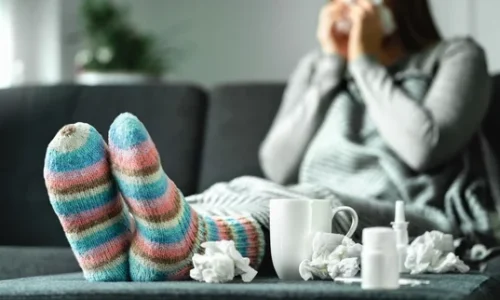- Judith Akatugba
- 0 Comments
- 640 Views
You’re probably worried that you or a loved one might be experiencing depressive symptoms if you’re reading this post. This is not a unique experience: Particularly since the pandemic began, there has been an increase in mental health problems.
Even while every person experiences depression differently, there are some common hallmarks of the condition, and they don’t all look like you may think. For example, not everyone who suffers from depression weeps all the time.
Read Also: The Ideal Time to Purchase a Home
We asked therapists to name these early warning indicators and offer guidance on what to do if you saw them.
1. Your energy is low
Reduced energy levels might be linked to various ailments, such as a common cold or sleeplessness. On the other hand, prolonged weariness in the absence of other medical symptoms could indicate the onset of depression.
According to Mary Tate, the founder of Tate Psychotherapy and a registered clinical social worker, this is one of the most noticeable symptoms in the early stages. According to Tate, “the most noticeable symptoms for many people are often high levels of fatigue and low energy.” “Depression can disrupt sleep patterns and elevate stress levels, which in turn impact serotonin and dopamine, two essential neurotransmitters involved in mood and energy regulation.”
2. You appear unable to concentrate
Some people struggle with concentration in general, whether it’s because they can’t seem to take their minds off of work or because TikTok is just a click away. Whatever the reason, being unable to concentrate can be a precursor to depression.
Tate stated, “Behavior activation is impacted by depression and this is how we all get things done throughout the day.” “Even seemingly insignificant chores like teeth brushing and putting on clean clothes can seem like enormous undertakings.”
Completing homework, paying attention in class, or reading a book are some other things that can be challenging to focus on.
3. You’re more anxious than normal
Anxiety is natural and can even boost productivity. But too much of it can be crippling.
According to Dr. Kristin Gill, a psychiatrist and chief medical officer of Minded, an online psychiatry business catering to women, “anxiety and depression are frequently accompanied by one another.” Anxiety and depression are frequently accompanied by symptoms such as exhaustion, trouble focusing, and trouble sleeping. It is also significant to remember that women are twice as likely as males to experience anxiety and sadness.
“It is vital to discuss your symptoms with a health care professional to determine whether you are suffering from depression or anxiety, or both, as this will inform recommendations for treatment,” Gill said. “Because anxiety and depression have overlapping symptoms.”
4. You’re isolating yourself socially
It could be a sign of sadness if you’ve been declining offers to go out for drinks with pals after work or if you find yourself lacking motivation to attend your monthly book club meeting.
Tate stated, “Depression can affect one’s ability to nurture oneself, let alone a relationship.” “One might experience decreased libido, a pessimistic outlook, and social distancing.”
Friendships and relationships may suffer as a result of this isolation, which may exacerbate depression symptoms. It frequently happens that someone’s symptoms of depression are noticed by others before they are by the sufferer.
5. Your personal hygiene is deteriorating
Hygiene-related chores like brushing your teeth, having a shower, and applying deodorant usually don’t take much work for those who are not depressed.
A licensed clinical social worker and JustAnswer mental health specialist named Jennifer Kelman says that someone suffering from depression could find it difficult to finish everyday tasks that used to be simple.
“When the lack of energy takes over, the simple acts of taking care of oneself and maintaining proper hygiene can feel too difficult and overwhelming,” Kelman said.
A self-reinforcing cycle of increased isolation and withdrawal from daily activities may result from neglecting one’s hygiene, which could then intensify depressed symptoms.
6. You’re either sleeping too little or too much.
Getting enough sleep is crucial for preserving one’s physical and emotional well-being.
About 80% of people who are depressed experience episodes of sleeplessness, which is a frequent symptom of depression. According to Gill, insomnia in depression usually manifests as trouble getting to sleep, remaining asleep, and waking up too early. “Depression can also be characterized by excessive sleeping, and some people experience both hypersomnia and insomnia in the same depressive episode.”
7. You’re more irritable than usual
It could be an early warning sign of depression if you’ve noticed that you’re more irritable or short-tempered lately, or if someone else has pointed it out to you.
According to Kelman, “anger turned inward is a common metaphor for depression.” People who are in pain could be easily agitated and show signs of resentment, frequently directed at themselves for being “down” or “sad.”
You might also observe that you get agitated over tiny, insignificant issues. Imagine you spilled a glass by accident or you were unable to use the TV remote to change the channel. Though frustrating, these circumstances may indicate depression if they cause an unjustified emotional response.
What to do if you’re experiencing these symptoms
It may be time to speak with a therapist or a doctor who can assist address these symptoms if you or someone you love is exhibiting any of these symptoms. (Of course, getting therapy isn’t always simple or inexpensive; here are some strategies to cut costs and some additional suggestions for mental health help.)
Modest lifestyle choices might also have a big impact. Getting a text from a buddy, taking a quick stroll, or getting a healthy dinner can all lift your spirits.
Like any other medical issue, depression requires attention and therapy. Don’t be afraid to ask for assistance.











